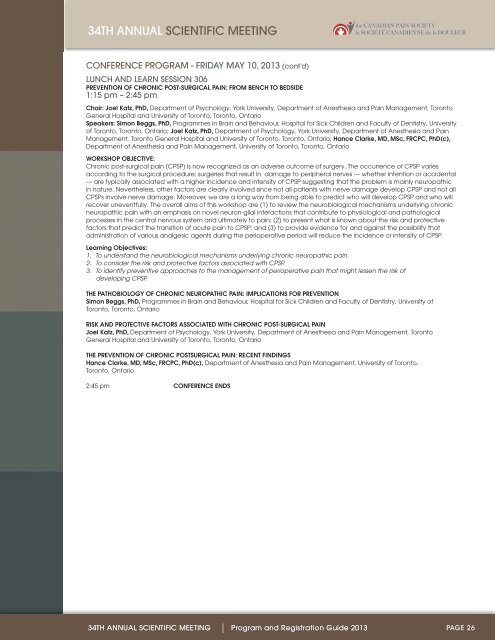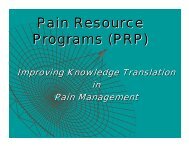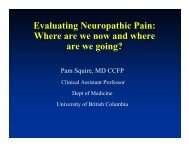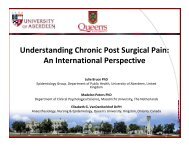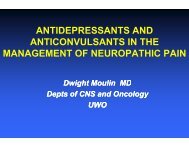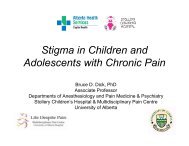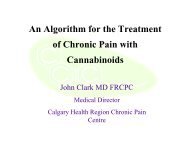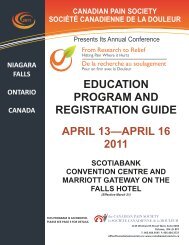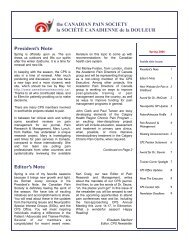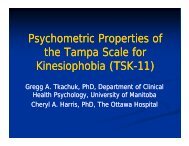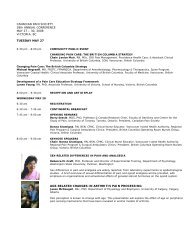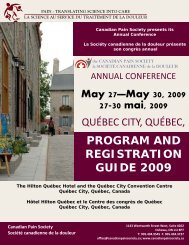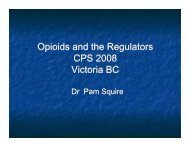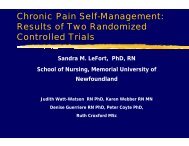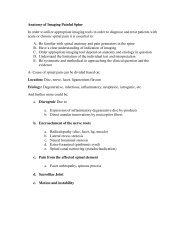Registration & Program Guide - The Canadian Pain Society
Registration & Program Guide - The Canadian Pain Society
Registration & Program Guide - The Canadian Pain Society
You also want an ePaper? Increase the reach of your titles
YUMPU automatically turns print PDFs into web optimized ePapers that Google loves.
34TH ANNUAL SCIENTIFIC MEETING<br />
CONFERENCE PROGRAM - FRIDAY MAY 10, 2013 (cont’d)<br />
LUNCH AND LEARN SESSION 306<br />
PREVENTION OF CHRONIC POST-SURGICAL PAIN: FROM BENCH TO BEDSIDE<br />
1:15 pm – 2:45 pm<br />
Chair: Joel Katz, PhD, Department of Psychology, York University, Department of Anesthesia and <strong>Pain</strong> Management, Toronto<br />
General Hospital and University of Toronto, Toronto, Ontario<br />
Speakers: Simon Beggs, PhD, <strong>Program</strong>mes in Brain and Behaviour, Hospital for Sick Children and Faculty of Dentistry, University<br />
of Toronto, Toronto, Ontario; Joel Katz, PhD, Department of Psychology, York University, Department of Anesthesia and <strong>Pain</strong><br />
Management, Toronto General Hospital and University of Toronto, Toronto, Ontario; Hance Clarke, MD, MSc, FRCPC, PhD(c),<br />
Department of Anesthesia and <strong>Pain</strong> Management, University of Toronto, Toronto, Ontario<br />
WORKSHOP OBJECTIVE:<br />
Chronic post-surgical pain (CPSP) is now recognized as an adverse outcome of surgery. <strong>The</strong> occurrence of CPSP varies<br />
according to the surgical procedure; surgeries that result in damage to peripheral nerves --- whether intention or accidental<br />
--- are typically associated with a higher incidence and intensity of CPSP suggesting that the problem is mainly neuropathic<br />
in nature. Nevertheless, other factors are clearly involved since not all patients with nerve damage develop CPSP and not all<br />
CPSPs involve nerve damage. Moreover, we are a long way from being able to predict who will develop CPSP and who will<br />
recover uneventfully. <strong>The</strong> overall aims of this workshop are (1) to review the neurobiological mechanisms underlying chronic<br />
neuropathic pain with an emphasis on novel neuron-glial interactions that contribute to physiological and pathological<br />
processes in the central nervous system and ultimately to pain; (2) to present what is known about the risk and protective<br />
factors that predict the transition of acute pain to CPSP; and (3) to provide evidence for and against the possibility that<br />
administration of various analgesic agents during the perioperative period will reduce the incidence or intensity of CPSP.<br />
Learning Objectives:<br />
1. To understand the neurobiological mechanisms underlying chronic neuropathic pain.<br />
2. To consider the risk and protective factors associated with CPSP.<br />
3. To identify preventive approaches to the management of perioperative pain that might lessen the risk of<br />
developing CPSP.<br />
THE PATHOBIOLOGY OF CHRONIC NEUROPATHIC PAIN: IMPLICATIONS FOR PREVENTION<br />
Simon Beggs, PhD, <strong>Program</strong>mes in Brain and Behaviour, Hospital for Sick Children and Faculty of Dentistry, University of<br />
Toronto, Toronto, Ontario<br />
RISK AND PROTECTIVE FACTORS ASSOCIATED WITH CHRONIC POST-SURGICAL PAIN<br />
Joel Katz, PhD, Department of Psychology, York University, Department of Anesthesia and <strong>Pain</strong> Management, Toronto<br />
General Hospital and University of Toronto, Toronto, Ontario<br />
THE PREVENTION OF CHRONIC POSTSURGICAL PAIN: RECENT FINDINGS<br />
Hance Clarke, MD, MSc, FRCPC, PhD(c), Department of Anesthesia and <strong>Pain</strong> Management, University of Toronto,<br />
Toronto, Ontario<br />
2:45 pm CONFERENCE ENDS<br />
34TH ANNUAL SCIENTIFIC MEETING <strong>Program</strong> and <strong>Registration</strong> <strong>Guide</strong> 2013 PAGE 26


